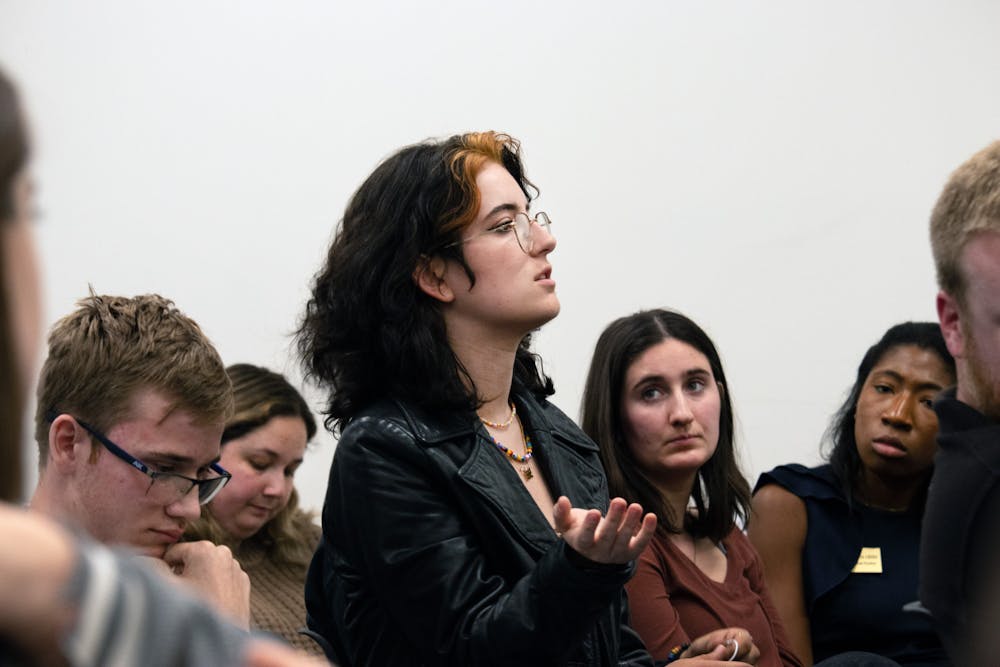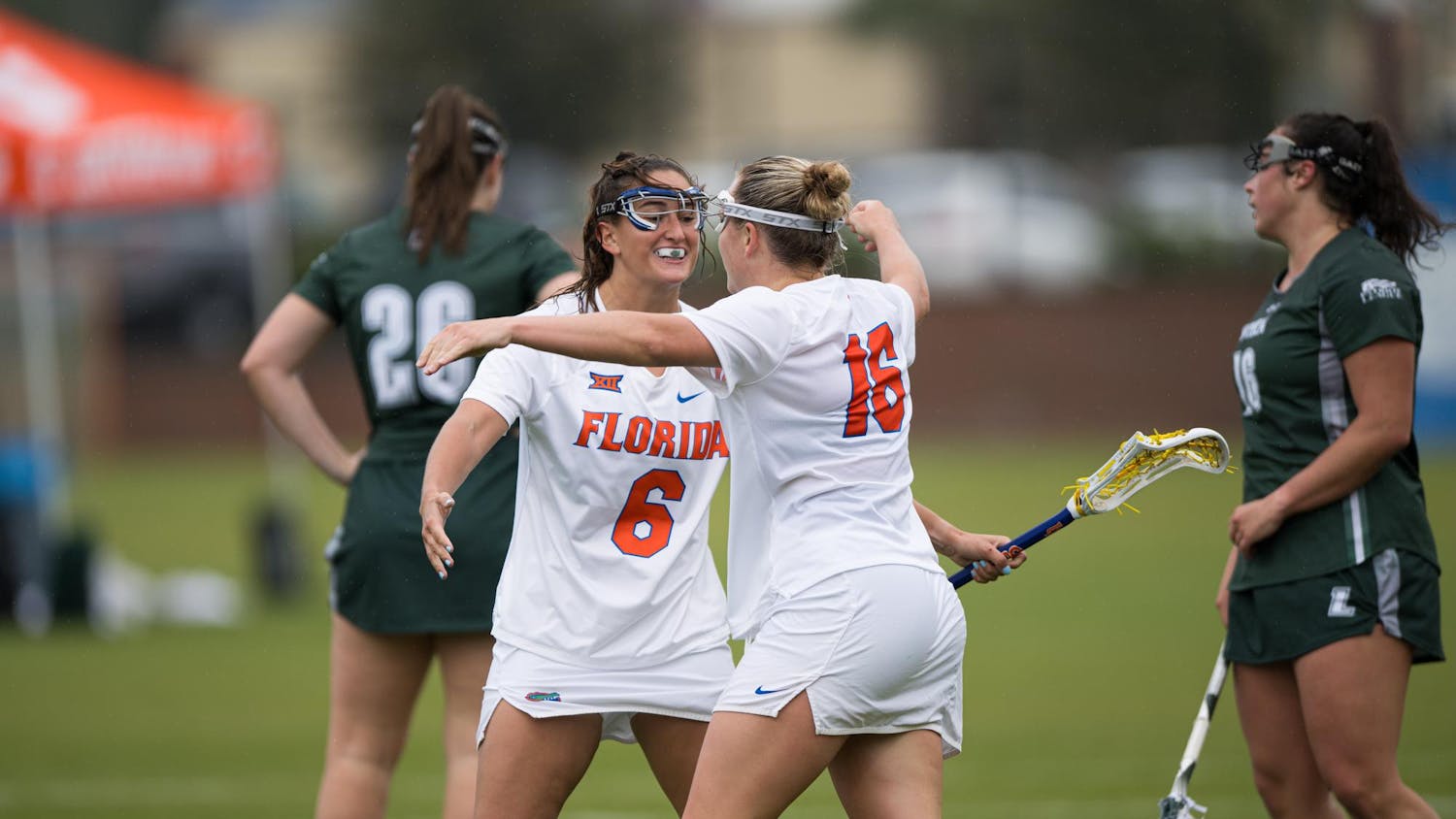From grievances over $80 cheese and crackers to a $225,000 cut from the student organization budget, students didn’t hold back their frustration with UF's current funding model at the Student Organization Funding Review Ad Hoc Committee’s first public forum Wednesday.
The Ad Hoc Committee was formed to provide a platform for representatives of student organizations to express their concerns and ask committee members about the funding process.
Roughly 30 people attended, including four of the seven committee members present: Vice-Chair Sen. Shelby Schultz (Gator-Sophomore), Sen. Max Durst (Gator-Liberal Arts and Sciences), Sen. Katie Berger (Gator-Liberal Arts and Sciences) and Finance and Affordability Cabinet Director Gianmarco Rodriguez. Senate President Olivia Green and Budget and Appropriations Committee Chair Emily Pecora were also in attendance.
“I really do want to work with members of the student body to make the funding cycle better,” Schultz said.
Student speakers belonged to organizations as varied as Young Americans for Freedom, Pride Student Union, Liquid Propulsion Development Team and Gator Motorsports.
Schultz began the forum by allowing students to voice their concerns.
A common complaint was perceived unfairness of the SGs’ current funding model. For each funding cycle, student organizations must submit a base funding request beginning at 9 a.m. on a specific date. Funding is then awarded to organizations on a first-come-first-serve basis.
Student representatives stressed this method allows some student organizations to receive a higher, and sometimes unnecessary, amount of funding only because they submitted a request faster than other organizations.
Students also echoed criticisms for the classification framework that went into effect July 1, which categorized student organizations as either General Registered Student Organizations (GRSOs) or University Sponsored Student Organizations (USSOs).
The policy states that GRSOs can receive funding from SG but not from university departments. USSOs cannot request funds from SG, but can only receive funding from departments.
Caitlyn McCoy, chair of the Young Americans for Freedom, a conservative student organization, expressed frustration with the group being denied travel, event and operational funds for Summer A 2022, Fall 2022 and Spring 2023.
“Josh Richards received $60,000 to rap about his sex life,” she said. “If this money exists in such vast amounts, why are only certain organizations receiving money?”
McCoy condemned SG for its excuse that her association’s funding problem is because her organization ran out of money, when other groups, like ACCENT Speakers Bureau, were given a large amount of funding.
Sydney Swartman, president of UF’s Out in Science, Technology, Engineering and Mathematics (oSTEM) chapter, discussed her organization’s need for more funding due to the rise in catering prices after UF’s switch of catering services last year: from Classic Fare to Palm & Pine.
“For a cheese and cracker spread, we used to pay $20, now we pay $80 because [Palm & Pine] requires you to purchase a certain minimum amount,” she said.
She also mentioned she was excited that the Ad Hoc Committee was formed with bipartisan support, but disappointed in the lack of bipartisan representation among the committee, as all the committee members serve in the Gator Caucus.
The last student to speak was Jack David, president of Gator Motorsports, who expressed frustration with the new classification framework. It terminated SG's funding of his organization in the Spring due to Gator Motorsports being classified as a University Sponsored Student Organization, meaning it cannot request funds from SG.
“Why is this university okay with approximately 20% of its student organizations on campus losing their funding?” David said. “Particularly when roughly 40 of those organizations are engineering-focused design teams that compete at a national level.”
Last semester, David said former Senate President Elizabeth Hartzog told him the UF Board of Trustees dismissed an SG proposal to increase the credit hour fee from $19.06 to $20 last summer, which would have increased the SG’s budget by roughly $3 to $4 million if approved.
Additionally, the student organization funding budget was cut by $225,000 this fiscal year.
David highlighted these events to propel his message that UF is choosing to ignore the financial needs of student organizations.
Hartzog also told him UF doesn’t have the resources to fund all student organizations due to new organizations emerging every year while the credit hour fee stays the same, David said.
While SG leaders said they didn’t have the funds to support student organizations, they were fine with financing a nearly $350,000 Roddy Rich concert at the O’Connell Center in February 2022. Only 3000 of the 6500 available seats in the venue were filled, he said, referencing The Alligator.
Like McCoy, David also critiqued the ACCENT Speakers Bureau's approximately $500,000 budget used to hold their speaking events with TikToker Josh Richards and television personalities Barbara Corcoran and Stephen A. Smith in 2022.
“Is the UF student body getting half a million dollars in value from these speakers coming to our campus,” he asked. “Is allocating funding to these areas worth eliminating funding to students?
Once David concluded his speech, Schultz opened the floor for questions.
Schultz acknowledged that most of the discussion hovered around critiques of the current funding model and urged attendees to suggest alternative funding methods that the committee could take into consideration.
All funding decisions for student organizations should be made on a needs basis, David said.
Sen. Connor Panish (Change-Yulee) said $400,000 of student organization funding allocated in the Fall wasn’t used and rolled over to the Spring’s funding cycle. He believes fixing the funding model should involve holding organizations accountable for not spending the money awarded to them.
“If an organization continually requests $3,000 and continually fails to use $3,000 they should be actively punished for that,” he said.
Panish suggested limiting or terminating funding for organizations that continuously request money they do not use.
When asked by students about the extent to which SG fights to negotiate budget increases with the Board of Trustees, Schultz noted that SG passed a 3% increase to the budget for the following fiscal year this past summer. However, the increase must be approved by the Board of Trustees and Gov. Ron DeSantis.
Senate President Olivia Green joined the conversation to reaffirm Schultz’s statement that DeSantis is the ultimate decider in expanding SG’s budget.
“Once it goes past the school it really is up to the governor,” she said. “I know it seems like people aren’t doing enough, but [SG leaders] are advocating year after year, and it’s just not happening.”
When asked about what would come from this meeting, Schultz said what has been discussed will only be used to execute changes for future budget cycles and that no changes will be made to funding decisions that have already been decided.
Although there is much more work ahead, Schultz said the forum was a successful first step in addressing concerns about SG’s funding model. The committee plans to review the grievances and suggestions presented by students and seek ways to improve the funding process.
Sen. Oscar Santiago Perez (Change-District D), who spoke at the forum as the Pride Student Union treasurer, said he’s disappointed this meeting is the first action taken by the committee since its establishment was announced Nov. 1.
“I really hope that this committee can hear the opinions and concerns that were expressed,” he said. “I hope to see some sort of change in terms of the funding model.”
Contact Amanda at afriedman@alligator.org. Follow her on Twitter @afriedmanuf.
Amanda Friedman is a senior journalism major and the Enterprise Editor at The Alligator. She previously wrote for the Avenue, Metro and University desks. When she isn't reporting, she loves watching coming-of-age films and listening to Ariana Grande.






